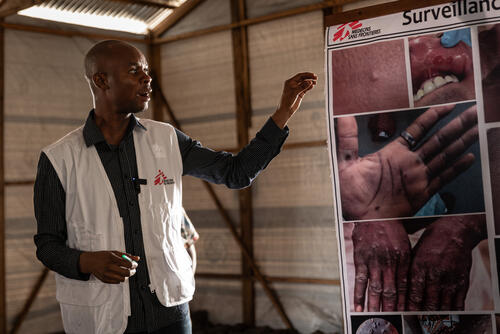The MSF Scientific Days bring together researchers, innovators, and advocates in humanitarian global health to discuss and challenge research from within the sector.
MSF Scientific Day is an annual conference in London highlighting medical research from fragile and conflict-affected settings, bringing together researchers, innovators, and advocates in humanitarian global health.
The conference demonstrates it's possible to conduct quality research in situations of humanitarian crisis, and it's imperative for MSF and others to support these communities to participate in and have access to research in order to:
- stimulate improvement in the delivery and quality of medical care and public health interventions
- inform humanitarian practice and policy, especially where there are no organisations addressing those knowledge gaps.
Call for abstracts: MSF Scientific Days 2026
Do you have medical research or an innovation that can transform the way MSF delivers healthcare?
Submit your abstract for the chance to present your work to MSF staff, academics, researchers, and leading journalists at MSF Scientific Days 2026. This global conference brings together participants from over 100 countries, with both in-person and online audiences— it truly is a conference without borders.
Once submitted, your work will also be considered for MSF Scientific Days Asia, Latin America, and Southern Africa events.
Past presenters have shared that speaking at MSF Scientific Days has enabled them to reach a wider audience and raise awareness of critical health issues.
Deadline for abstract submission:
18 January 2026 at 23:59 GMT
Submissions are accepted in English, French, and Spanish.
Other MSF Scientific Days
Scientific Days Asia 2025 will take place on 19 September in Colombo, Sri Lanka, showcasing research and innovation from across the region.
Watch recordings from the 2025 conference
If you missed a session or would like to revisit the discussions, all content is now available to watch on demand via the online platform. You will be able to use the same login details that you used for the live event. Explore insights from the field, innovative research and thought-provoking discussions at your own pace.
Recordings will be available for six months after the event.
Recordings of all presentations are available on the MSF Science Portal >
Highlights from our 2023 event
Missed our event on 7 June 2023? You can find all of our content on the MSF Science Portal
Our 2023 event showcased research conducted by MSF, its partners and beyond, and featured four sessions on topics ranging from tuberculosis and operational strategies to reproductive health and outbreaks. Some of the emerging themes were:
- The importance of meaningful patient engagement to achieve more appropriate research and interventions. Sohana Saddique presented on a successful collaboration between MSF and two factories in Bangladesh to improve workplace safety. Here, active participation from the factory owners and workers helped in co-creating effective interventions and infrastructure changes that could be sustained in the absence of MSF.
- The scope of humanitarian health action was questioned, particularly the extent of MSF’s responsibilities in situations that require longer term presence. In addition to this, Sakib Burza urged us to look beyond the immediate impacts of humanitarian health action, presenting an example of the environmental benefits that can be achieved by providing support to communities in ecologically critical areas in Borneo. Average deforestation rates were significantly lower in villages provided with healthcare and livelihoods support, illustrating that the resilience of these communities is tied to the environment.
- The urgency to move beyond solely lifesaving activities was highlighted as our focus begins to expand to include measures of quality of life and patient-reported outcomes. This attitude shift was discussed during Beverley Stringer’s presentation on patient experiences from the TB-PRACTECAL clinical trial and emphasised in Matthew Coldiron’s presentation on the need for aftercare in light of the long-term effects of a meningitis epidemic that occurred in Niger in 2022.
Finally, two noteworthy studies from our partners were presented which we want to highlight:
Epicentre’s Estelle Pasquier on the high severity of abortion complications in fragile and conflict-affected settings, and DNDi’s Alexandra Solomos on a shorter, safer treatment for visceral leishmaniasis.
If you missed previous events you can catch up here:
MSF Asia Scientific Day 2022
MSF Scientific Day International 2022
MSF Scientific Day Southern Africa – Zimbabwe
Visit the MSF Science Portal to watch all content from previous years
Sign up to our mailing list to stay up to date on all the latest news:
